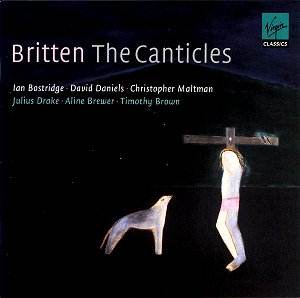Britten’s five Canticles are marvellously vivid, intensely
dramatic works. At least two of them could easily be staged, so evocative
is their imagery. Given the composer’s genius with operatic form, this
is really no surprise, and the artists on this disc certainly make the
most of this inherent theatricality.
The works themselves form an effective sequence, even
though they were written over a period of nearly thirty years. Each
is in some way religiously inspired and takes the form of an extended
song, scena, miniature cantata or even, in the case of Abraham and
Isaac, virtually a mini opera. The vocal writing throughout all
the pieces, even the earliest, is remarkably varied and assured, and
the accompaniments, even when it is piano alone, are astonishingly inventive.
As with all Britten’s major works, the composer himself, together with
his trusted artistic circle, has recorded the benchmark version. In
the present case, it is a mid-price Decca London issue featuring Peter
Pears, James Bowman, John Shirley-Quirke, Barry Tuckwell and Osian Ellis,
a formidable line-up by any standards. Nevertheless, the artists on
this new Virgin disc form what might be termed the ‘new generation’
of Britten interpreters, and with wonderfully vivid, clear digital sound,
there is much to recommend it.
My own feeling is that Abraham and Isaac is
the greatest of the five, maybe because of the sheer scale of dramatic
intensity packed into a mere 17 minutes. Its subject, the sacrifice
of a child, would always be likely to appeal to Britten’s sensibilities
– pity for the plight of children was one of his deepest feelings. Daniels
delivers with devastating simplicity the words "Father, do with
me as you will" as he submits to his father’s will and, of course,
deliberately foreshadows Christ’s words on Gethsemane. Though written
for Pears and Kathleen Ferrier, I have always felt the piece works better
with two male singers, not least in the strikingly original opening,
where both soloists, intoning in close harmony, evoke the voice of God
himself. This moment mightily impressed Stravinsky, and Britten was
to use the device again ten years later in the War Requiem. Bostridge
and Daniels are noted for their superb enunciation, and no moment, however
fleeting, is missed. Praise too for Julius Drake, Bostridge’s regular
partner, who underpins proceedings with real sensitivity and, where
required, fingers of steel – listen to the earthquake-like bass rumblings
at 12.40. as Abraham is about to kill his own son.
Bostridge sings with the same customary sensitivity
and warmth of phrasing in My Beloved is Mine, and the contributions
of Timothy Brown (in Still Falls the Rain) and Aline Brewer (in
The Death of Narcissus) are as musicianly as one could hope for.
The wonderful blending of Bostridge, Daniels and Christopher Maltman
in Journey of the Magi make for an uplifting experience,
and the spiritual mystery and questioning of Eliot’s text is vividly
realised.
The last 18 minutes of this generous disc is given
over to the three singers performing a decent selection of the folksong
settings. Many Britten collectors will no doubt have their own favourite
artists in these delightful miniatures, but it’s hard not to respond
favourably to the present interpretations. The Sally Gardens
has Maltman clearly enjoying himself, and Bostridge’s appropriate simplicity
of utterance in The Ash Grove is most moving. The most
original feature of these settings, the wonderfully quirky accompaniments,
shows us Drake’s real abilities as a partner – nothing is forced, everything
beautifully weighted and judged.
Recording quality, as mentioned above, is exemplary,
and there are very full and readable notes from Dr. John Evans. Full
texts are provided. To my ears, a very worthwhile addition to the Britten
discography.
Tony Haywood


